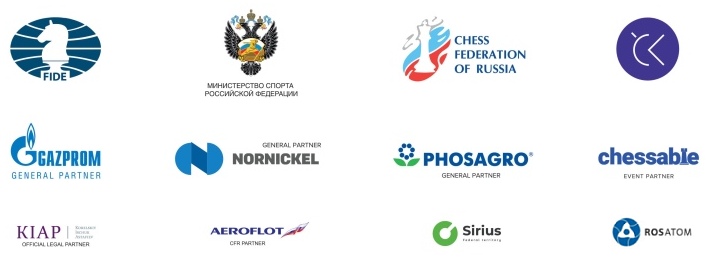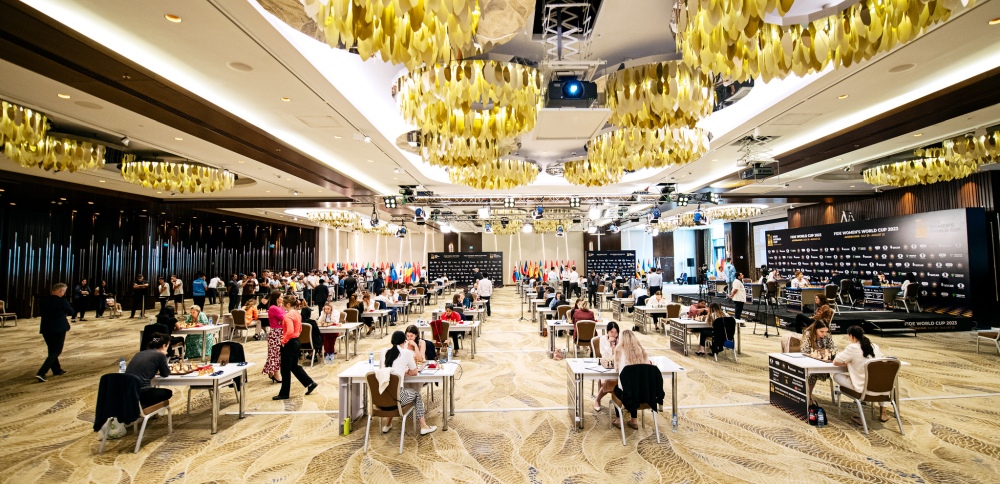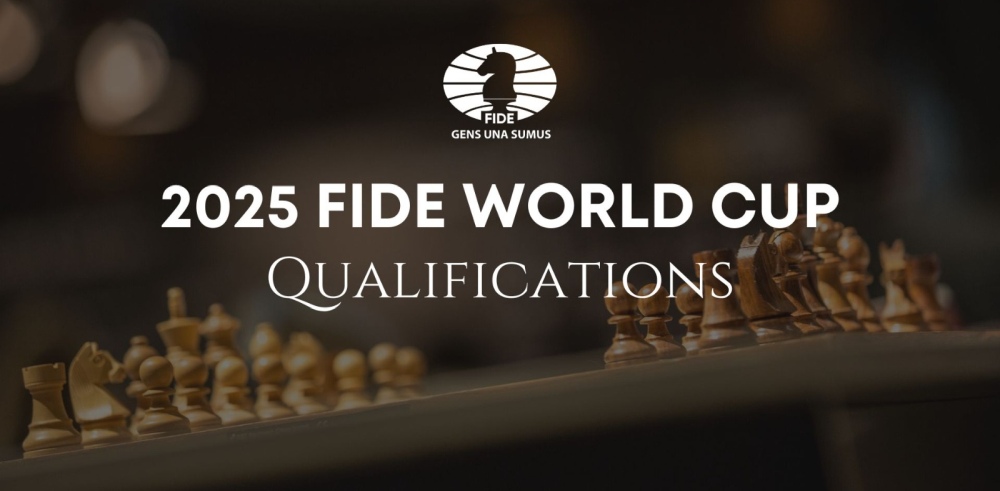
All-Russian women’s final between Goryachkina and Kosteniuk
Friday, July 30th, 2021 – Although in the women’s group game two of the semi-finals were being played, most of the attention –online but also in the press room – was focused on the tiebreak match between GM Sam Shankland (2709), representing USA and GM Sergey Karjakin (2757), the Russian local hero.
The winner would not only advance to the Open Group semi-finals but would also acquire a very decent shot at the 2022 Candidates qualification (there are two spots in play here).

As usual, the tiebreak format is nerve-wracking; two 25 minutes + 10-second increment rapid games, followed by two 10/10 games. If there is still not a winner, two Blitz games 5/3 followed by a “sudden death” Armageddon game eventually decides the match.
In the first 25/10 game, Shankland opened with 1.c4 but after a few moves the game headed down the paths of the Catalan Opening, a line that has a very solid reputation. Both players started their maneuvering tactics: for the most part, it seemed clear that they were playing it safe.

The position remained balanced until Karjakin blundered with 33…Nc7? and then again with 36…Qd2? It’s always tricky for an annotator to suggest what he might have missed: maybe the 39.Bxc6 sacrifice, leaving White with two passed pawns and a clearly winning position.
Karjakin defended as best as he could, but there was no way that Shankland was going to let this unique opportunity slip through his hands, and his endgame technique was more than enough to take the point home.
Karjakin’s body language in the second game was unmistakably aggressive. After being crushed in the French in the classical games, Shankland brought back his beloved Sicilian but didn’t react well to White’s setup.
Sergey Karjakin - Sam Shankland
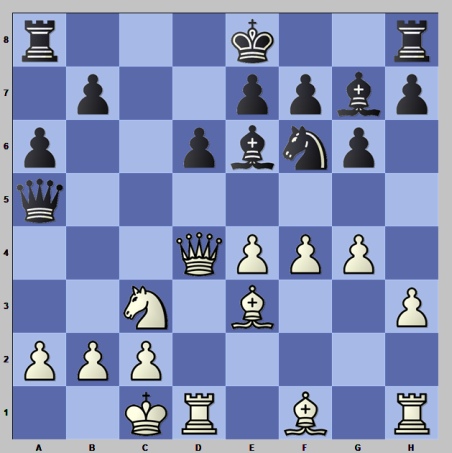
Already in the opening, 11…Qa5? was a big mistake, which Karjakin punished mercilessly with 12.f5!
Again, it’s hard to know exactly where Shankland’s preparation was flawed – generally these mistakes happen due to mixing-up the different move-orders - but he was soon a piece down for two pawns. Karjakin wrapped-up the game and forced the second series of 10/10 rapids.
Karjakin won the toss and played White again in the first of the two 10/10 rapids. On his tenth move he went for 10.e5 – home preparation – instead of 10.0-0-0, not expecting Shankland to repeat the same mistake twice. Kudos to his second Denis Khismatullin for preparing this idea during while the second game was being played!

Shankland accepted the invitation, and after the exchange of queens he was a pawn up, but Karjakin had huge positional compensation and cashed in after a couple of dubious moves played by the American.
Ahead on the score-cards, Karjakin chose the solid Queen’s Indian defence for the second 10/10 game. Although he was somewhat worse in a queen-rook endgame, his defensive skills came into play once again.
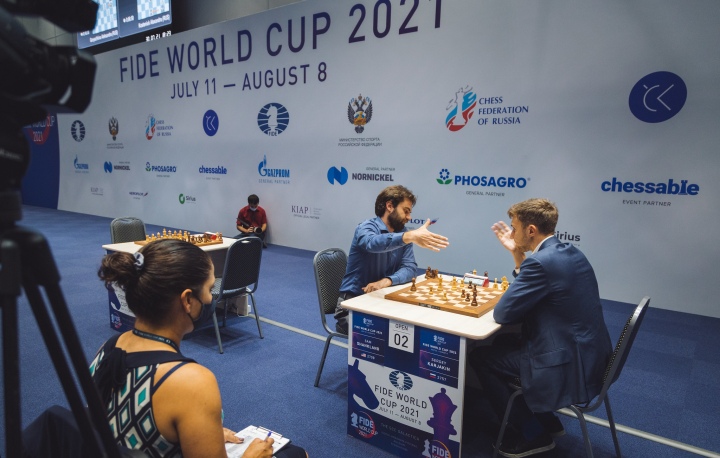
With no other choice, Shankland over-pressed in the ending and “The Comeback Minister” qualified to the semi-finals.
A very happy Sergey Karjakin gave us his thoughts on the match in a brief interview, cheered on by many supporters from the rail.
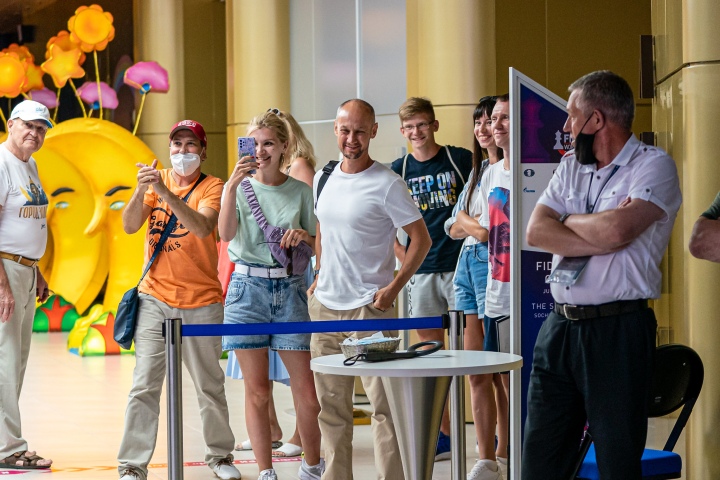
After two draws in the first game, it was all on the line in the women’s section. Would GM Aleksandra Goryachkina (2596) from Russia, be able to take advantage of the white pieces and defeat her opponent, Ukrainian GM Anna Muzychuk (2527).
What about the second game? GM Alexandra Kosteniuk (2472), playing for Russia, looked great in game one, seamlessly equalising with no effort at all in her game against GM Tan Zhongyi (2511) from China. How would the second game go, now that she would be playing with White.
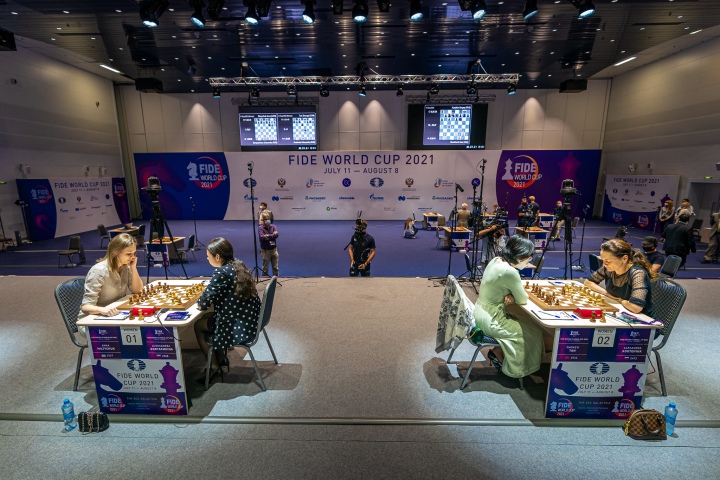
Goryachkina opened with 1.d4 and Muzychuk responded with the 10…Qa5+ / 11…Qa3 side-line in the Grunfeld defence, which had already been tried out here in the fifth round between Kateryna Lagno and Tan Zhongyi.
Goryachkina spent quite a lot of time in the opening but found an interesting idea, isolating Black’s doubled pawns with a timely exchange of bishops on e6. Soon after, Muzychuk sacrificed a piece on d4 having calculated that she was getting it back with equality, but the idea was bad:
Aleksandra Goryachkina - Anna Muzychuk
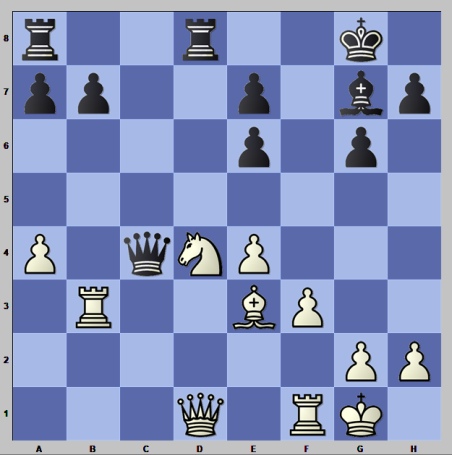
Goryachkina could have won on the spot with 21.e5! but she chose 21.Rxb7 instead.
After more than forty minutes of thought, Muzychuk opted for the exchange of queens, transitioning into a double-rook ending, which was slightly worse but defendable.
However, Goryachkina piled on the pressure, played for the two weaknesses and notched up the win and the qualification to the Women’s World Cup final.
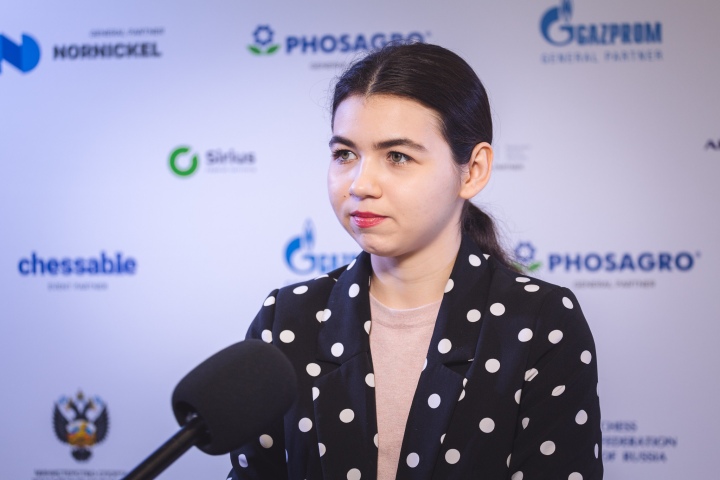
Meanwhile, in the other semi-final game, Alexandra Kosteniuk surprised Tan Zhongyi with the so-called Keres-Kaufman attack against the solid Petroff Defence (5.c4).
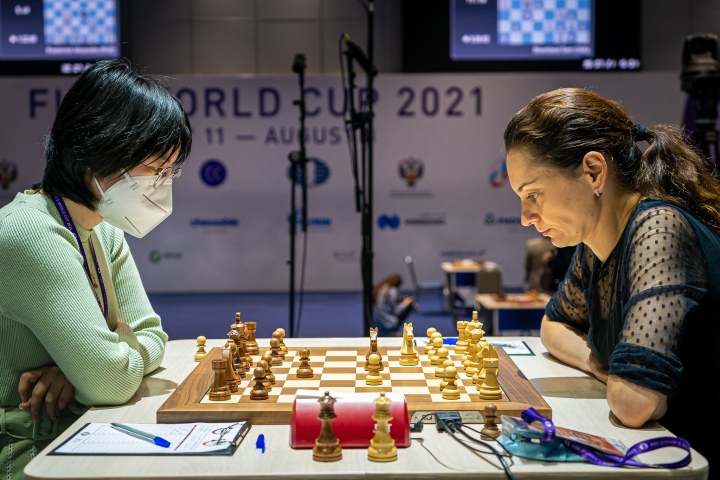
She achieved a small edge going into the middlegame, with a strong knight on b6 and two bishops pressuring the centre.
Alexandra Kosteniuk - Tan Zhongyi
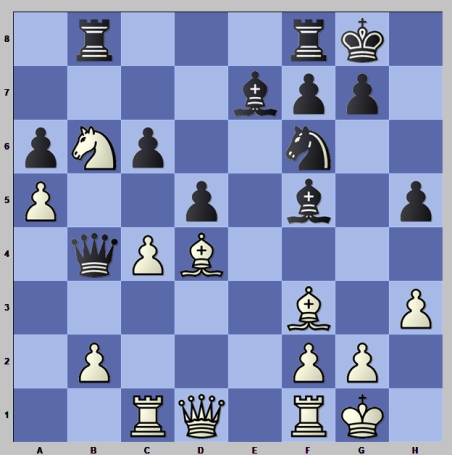
Under serious pressure, Tan Zhongyi blundered with 19…dxc4? possibly missing that after 20.Rxc4 Qxa5 21.Ra4 Qb5 22.Be2! traps the queen. However, Kosteniuk had another idea in mind – to sacrifice her own rook for the opponent’s bishop on e6 after 22.Re1 Be6? 23.Rxe6 And it worked out!
The former world champion from China was unable to find the best defence and eventually crumbled under the pressure.
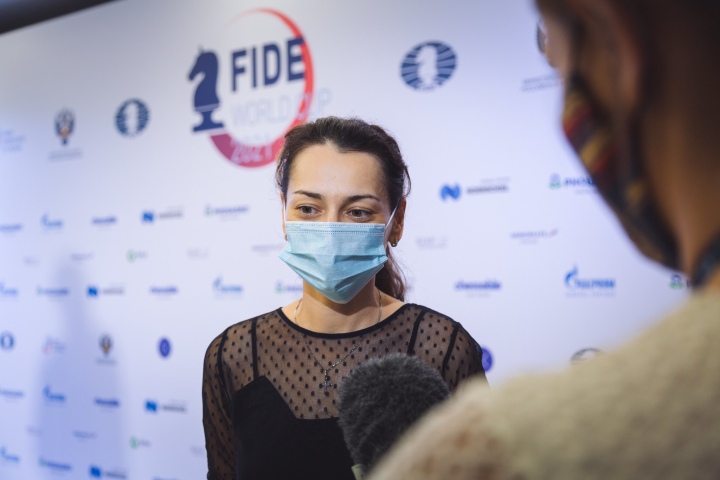
Although visibly tired after the huge effort, Alexandra still found time to attend to the press and give us her thoughts on the match and her qualification to the World Cup final.
Tomorrow, Saturday, July 31st is the second free day. The World Cup Open semi-finals along with the Women’s final (and third-fourth place match) will begin on August 1st.
More information on the World Cup website:
Pairings of the rounds, live games and PGN files can be found on the World Cup website alongside a great amount of other interesting information such as daily videos, a complete photo collection and other useful data.
Text: Michael Rahal, FIDE Press Officer press@fide.com
Photo: Eric Rosen and Anastasiia Korolkova
About the tournament:
Scheduled to take place from July 12th (Round 1) to August 6th (finals), the 2021 FIDE World Cup will gather together in Sochi (Russia) 309 of the world’s best chess players, with 206 of them playing in the Open World Cup (and 103 participants in the first-ever Women’s World Cup.
The top two finishers in the tournament, aside from World Champion Magnus Carlsen who is also participating, will qualify for the 2022 Candidates Tournament, in addition to winning the 110.000 USD first prize (80.000 USD for the runner-up).
Organisers: International Chess Federation (FIDE), Chess Federation of Russia, Russian Ministry of Sports, and Government of Krasnodar Krai.
Partners:
Gazprom – general partner
Nornickel – general partner
PhosAgro – general partner
Chessable – event’s partner
Aeroflot – CFR’s partner
